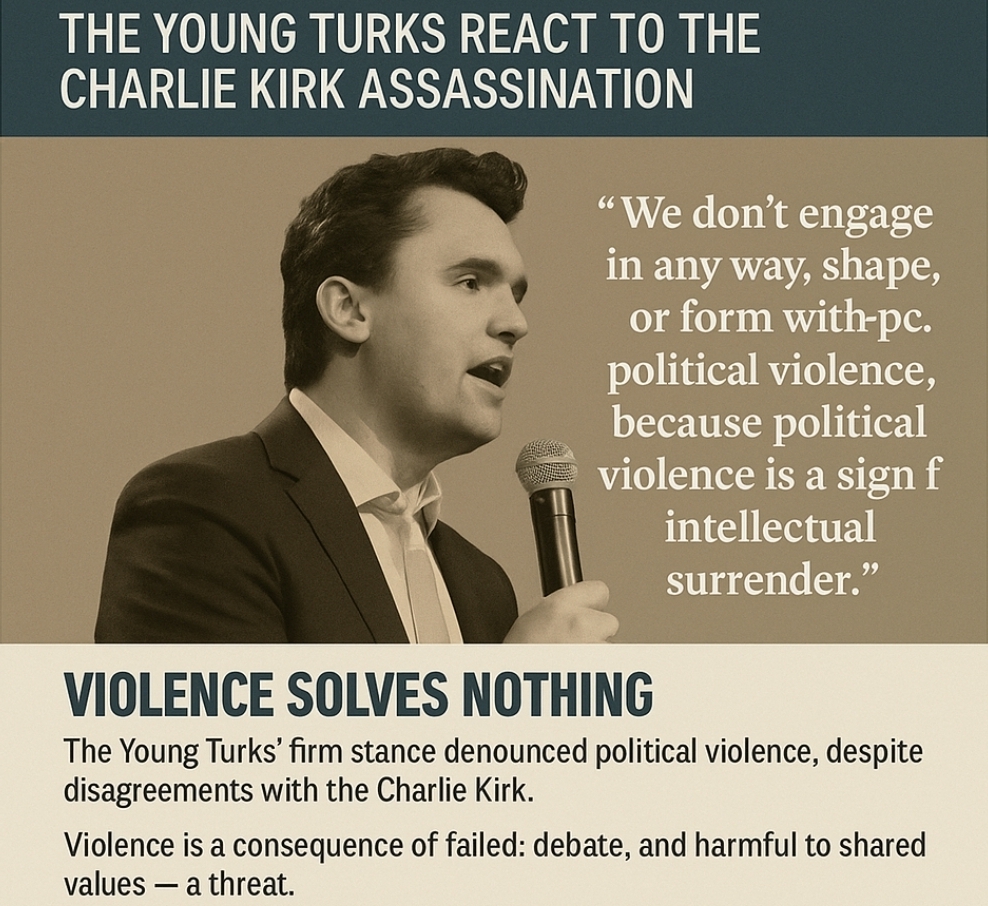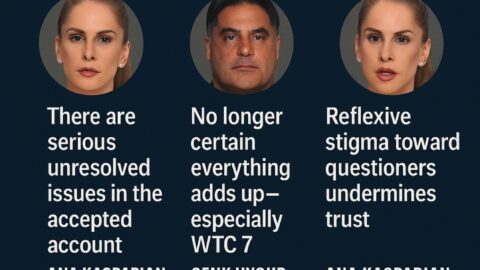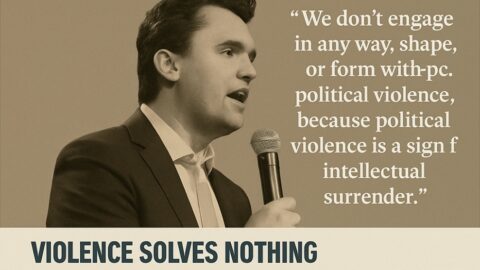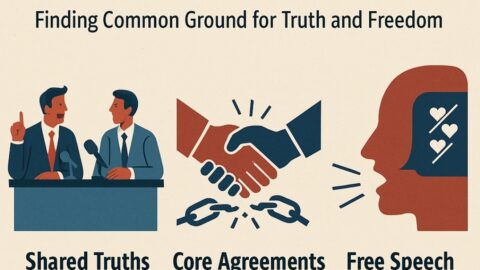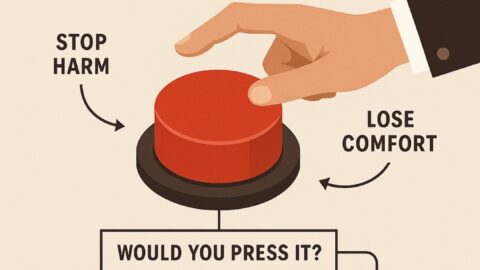In a live, real-time segment, Cenk Uygur and his co-hosts grappled with shock, grief, and the politics of what comes next.
Chase Hughes often reminds us of the power of listening—really listening—even when it’s to people we strongly disagree with. The discipline of hearing another perspective, without rushing to defend or retaliate, can open surprising common ground. Beneath the noise of politics and ideology, most human beings want similar things: dignity, safety for their families, freedom to live by conscience, and a chance at a meaningful life. If we can pause long enough to see the person across from us, not just the label they wear, we discover how much agreement exists at the level of shared humanity.
It’s against this backdrop that the assassination of Charlie Kirk—and the reactions it stirred—force us to ask hard questions about what happens when listening breaks down and violence takes its place. The Young Turks called it what it is: “violence is intellectual surrender.”
The gut-punch and the line in the sand
The Young Turks opened with disbelief. “Charlie Kirk was shot and killed today… I can’t believe it,” Cenk Uygur said, before laying down a nonnegotiable principle: violence is “never, ever, ever the answer.” He called political murder “intellectual surrender”—what you choose when you can’t win with ideas—and insisted anyone cheering it is abandoning the left’s core ethic of nonviolence.
From the first minutes, the show separated politics from humanity. Uygur offered condolences to Kirk’s wife, Erica, and their two very young children. Another host, John Iadarola, added that for people who speak about politics for a living, this is the nightmare scenario: a reminder of how dark the climate has become and how normalized violent fantasies now feel online.
What they knew while it was unfolding
Because the segment aired as news was breaking, the panel read out early details as they had them:
- The shooting occurred during a Utah Valley University event.
- UVU closed its campus and canceled classes.
- Videos circulating online were described as graphic; TYT refused to air them.
- A witness quoted in coverage said he was “surprised by the lack of security” and that entry checks were minimal.
- A Truth Social post from Donald Trump announced Kirk’s death and offered condolences.
TYT repeatedly flagged the uncertainty of early reporting and avoided playing the clip of the shooting.
Empathy first, politics nowhere
Multiple hosts said the disagreements they had with Kirk were irrelevant in this moment. “This man should be here,” one said, emphasizing the simplest truth: a husband and father is gone. TYT read viewer comments, including a conservative member who admitted to feeling “a growing vengeance” and a progressive member who was “sickened” by people cheering the death. Uygur’s answer to both: hold the line on empathy, and do not feed cycles of retaliation.
“Don’t you dare cheer this”: Condemning celebration, warning about blowback
Uygur reserved special ire for anyone celebrating the killing or minimizing it. Debate happens in the “battle of ideas,” he said, not “bullets and murder.” Even setting morality aside, he argued, celebrating is catastrophically counterproductive:
- Escalation risk: It invites retaliatory violence from armed partisans.
- Wider danger: It increases threats against all public actors; TYT noted death threats are commonplace for hosts across the spectrum.
- Political backfire: It turns Kirk into a martyr and hardens camps.
Iadarola worried about the second-order effects: calls to treat “the left” collectively as culpable, pressure on government to launch sweeping crackdowns, and the possibility of both copycat attacks and reprisal violence, regardless of the eventual motive of the shooter.
A culture drenched in blood talk
Beyond the single incident, the panel described a country desensitized by constant violent rhetoric and a churn of incidents that barely stick in the news cycle. Iadarola cited how quickly even shocking attacks fade from headlines, arguing that ambient “blood lust” memes and fantasies have made dehumanization feel normal. That, they warned, is the tinder that lets a single spark ignite something worse.
What the left should do now (as TYT frames it)
Uygur urged the audience—especially those who identify as left or pro-peace—to “double down” on empathy and nonviolence:
- Reject whataboutism today; focus on the human loss.
- Channel rage productively, not destructively.
- Protect the speech arena—if people fear they’ll be “next” for speaking, the republic shrinks.
He also cautioned that violent moments invite state responses that curtail civil liberties. Historically, that’s bad for everyone—and, TYT argued, especially bad for movements that rely on dissent.
The MLK ethic
Uygur invoked Martin Luther King Jr.: “Hate cannot drive out hate. Only love can.” The point wasn’t saccharine; it was strategic. Adding hate multiplies it. Empathy is the only force that actually reduces violence. The show pointed to other conflicts—Israel/Gaza among them—to say more killing never advances justice; peace and empathy do.
Security, speech, and the chilling effect
A witness’s account of limited event security became a concrete caution. TYT hosts who do public events said they’d have to think differently about safety now. But they also worried aloud about speech: when violence rises, people self-censor; when fear rules the room, fewer people are willing to argue in public. That’s a loss for democracy long before any formal crackdown arrives.
The bottom line TYT wanted on the record
- Violence is immoral and strategically ruinous.
- Empathy is nonnegotiable—especially toward the bereaved family.
- Don’t collectively punish or generalize. Wait for facts; don’t scapegoat entire groups.
- Keep politics in the arena of ideas. Force is not argument.
- Beware escalation—both vigilante and state. Crackdowns and reprisals are real risks.
- Model humanity in public. TYT explicitly distanced itself from any celebratory reactions and said it would “fight” that mindset with words, not violence.
A closing appeal
The segment’s through-line was simple and hard: mourn a human being, condemn the killing without caveat, and refuse to let a murder become a pretext for more. The measure of the moment, the hosts argued, is whether we can hold fast to empathy and keep the fight where it belongs—on the plane of ideas, not blood.
Point-by-point breakdown of the Young Turks segment (Cenk Uygur and co-hosts reacting in real time). This reflects what they said in that clip, including places where facts were still emerging.
1) Opening and moral stance
- Announcement & shock: “Charlie Kirk was shot and killed today… I can’t believe it.”
- Immediate line in the sand: Violence is “never, ever, ever the answer.” It’s “intellectual surrender” and “immoral.”
- Identity of the left (as Cenk frames it): If you’re for violence, “you are not on the left.” The left is a non-violence, peace movement.
- Condolences: Specific empathy for Kirk’s wife, Erica, and their two young children.
2) Early facts they recited (while news was unfolding)
- Location & setting: Utah Valley University event.
- Shooter status: Not in custody at the time of taping.
- Graphic footage exists: TYT refuses to air it.
- Campus response: UVU closed campus and canceled classes.
- Shot distance (as reported): From a building ~200 yards away.
- Context moments before the shot: Kirk was answering a question about mass shootings (“Counting or not counting gang violence?”).
- Witness detail (as read from reporting): Attendee surprised by lack of event security or checkpoints.
- Trump’s post: They read a Truth Social message announcing Kirk’s death and offering condolences.
3) Personal reactions from the hosts
- Cenk’s reaction: Disbelief, then heartbreak—“I’m still stunned.” Emphasizes he’s stood in that same kind of venue many times and now fears wider danger.
- John’s reaction: Sees it as a “worst case scenario” for those who comment publicly on politics; says this is the darkest period he’s seen for normalized violent talk and fantasies.
- Third host’s reaction: Didn’t know Kirk personally but felt the human loss—“this man should be here.” Political disagreements become irrelevant in the face of murder.
4) On public reactions and “celebrations”
- Cenk’s position: If anyone is celebrating or minimizing the murder, he’s there to “shame” that. You fight in the “battle of ideas,” not “bullets.”
- Scope caution: They hope celebratory reactions are a tiny fringe; they reject the notion that “the left” broadly is cheering.
- Member comments read aloud:
- A conservative viewer expresses “growing vengeance” but is trying not to radicalize.
- Another viewer is sickened by people cheering, grateful to see empathy modeled.
5) Why celebrating or justifying is (in their view) wrong and self-defeating
- Morally obscene: “Deeply immoral not to be outraged.”
- Counterproductive:
- Risks escalating reciprocal violence (“millions on the right… in a blind rage”).
- Increases threats against all public figures (they note routine death threats to TYT hosts too).
- Politically backfires (“you’ve made Charlie Kirk a martyr”).
6) Broader climate of violence
- Normalization: John cites the piling up of violent incidents that disappear from the news cycle quickly.
- Ambient bloodlust online: Fantasies/jokes about opponents’ deaths are too common and desensitizing.
- Copycat or retaliatory risk: Regardless of the shooter’s ultimate motive, incidents can spur imitators or reprisals.
7) Calls from the right they worry about
- Escalatory rhetoric: They cite powerful voices (e.g., Christopher Rufo) calling to target “the left” broadly (NGOs, donors, groups).
- State power concern: Fear that Trump (or any administration) could be pressured to use government power aggressively against political opponents post-assassination.
8) What the left “should” do now (as TYT frames it)
- Double-/triple-down on empathy: Feel for the family; remember the principle of non-violence.
- Reject “whataboutism” today: Focus on the human loss and the danger of escalation.
- Channel rage productively: Don’t feed spirals that worsen conditions for everyone.
- Peace first: They reference Israel/Gaza to argue more death never brings justice—only peace and empathy can.
9) MLK’s ethic and why it matters here
- Quote invoked: “Hate cannot drive out hate. Only love can.”
- Reasoning: Adding hate multiplies hate; empathy is the only path that actually reduces it.
10) Speech, fear, and downstream risks
- Chilling effect: When violence rises, people self-censor; anyone speaking publicly can wonder if they’re “next.”
- Civil liberties risk: Violent moments invite crackdowns; historically, that means fewer rights and less space for dissent—especially bad for the left, they argue.
11) Security & logistics (as the hosts see it)
- Event security gaps: That witness quote about no checkpoints becomes a cautionary tale.
- Practical fear: TYT hosts who do public events say they’ll have to think differently about safety going forward.
12) Final through-lines they wanted viewers to take away
- Violence is never the answer: It’s immoral and strategically ruinous.
- Empathy is non-negotiable: Especially toward the bereaved family.
- Don’t generalize or collectively punish: Wait for facts; don’t scapegoat entire groups.
- Defend debate over force: Keep political conflict in the arena of words and ideas.
- Beware escalation cycles: Both vigilante retaliation and state crackdowns are real risks.
- Model humanity: TYT explicitly distances itself from any celebratory or minimizing reactions and “fights” such reactions with words, not violence.

